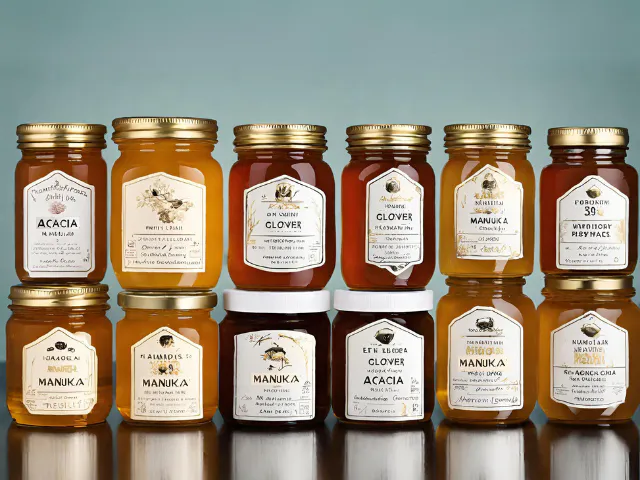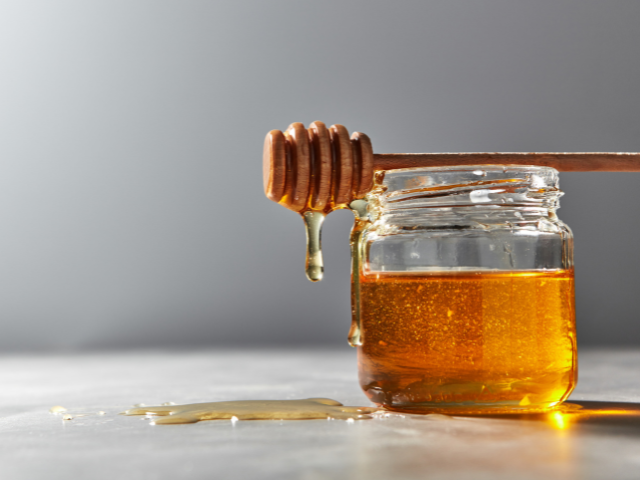Honey benefits us all, a golden elixir produced by diligent bees, has been cherished for millennia not just for its sweet taste but also for its myriad health benefits. This natural sweetener, derived from the ambrosia of flowers, is more than just a sugar substitute. It’s a testament to nature’s ability to provide remedies, nourishment, and pleasure in one delightful package.
Key Takeaways
- Nature’s Gift: Honey isn’t just a sweet treat; it’s a natural powerhouse packed with nutrients and healing properties that have been recognized for centuries.
- Raw vs. Processed: The form in which you consume honey matters.
- Varieties Matter: From the famed Manuka honey to the everyday blossom varieties, each type of honey brings its own set of potential health benefits and unique flavors to the table.
- A Holistic Approach: Embracing honey in our daily lives goes beyond just diet. It’s about adopting a holistic approach to health and wellness, where honey plays a pivotal role.
- Safety First: While honey is a boon for many, it’s essential to be aware of certain precautions, especially when considering it for young children.
Honey Benefits: More Than Just a Sweetener

Honey Nutrition and What Makes It Good
Honey is a treasure trove of nutrients. Unlike refined sugars, which offer empty calories, honey is rich in vitamins, minerals, and beneficial compounds.
- Honey Contains: Essential nutrients that our bodies crave. From natural sugars like glucose and fructose to trace minerals, enzymes, and amino acids, honey is a nutritional powerhouse.
- Antioxidant Properties: One of honey’s standout features is its rich antioxidant content. These antioxidants help combat free radicals in the body, playing a crucial role in protecting our cells from damage and potentially warding off diseases.
The Health Benefits of Honey
The tales of honey’s health advantages aren’t just old wives’ tales; they’re backed by science and centuries of anecdotal evidence.
- Honey is a Natural…: Remedy for a range of ailments. Its anti-inflammatory properties can soothe sore throats, while its antibacterial qualities can help combat infections.
- Antibacterial Qualities: Its natural composition makes it a hostile environment for bacteria. This is why honey has been used as a wound healer since ancient times.
- Wound Healing: The enzymes in honey may help reduce inflammation and promote the body’s natural healing processes. This is especially true for raw honey, which retains all its natural properties.
- Cough Relief: A spoonful of honey can also be more effective than many over-the-counter cough syrups. Its thick consistency coats the throat, providing relief from irritation, while its natural compounds help reduce inflammation.
Types of Honey: From Hive to Bottle

Honey, in its essence, is a simple product, a result of bees collecting nectar from flowers. However, the variety of flowers and the process after collection can lead to a vast array of honey types, each with its own unique flavor, texture, and health properties.
Raw Honey vs. Processed Honey
The way honey is treated after it’s harvested can significantly impact its nutritional value and health properties.
- Unprocessed Honey: Often referred to as raw honey, this form is straight from the hive. It retains all its natural enzymes, vitamins, and minerals. Raw honey benefits are unparalleled as it remains untouched by heat or filtration processes that might strip away its goodness.
- Processed Honey: While it might have a clearer appearance and smoother texture, processed honey has been heated and filtered, potentially losing some of its natural benefits. It’s essential to read labels and understand what you’re getting.
- Crystallized Honey: Over time, honey can change in texture, leading to a crystallized or grainy appearance. This is a natural process and doesn’t diminish quality or health properties. In fact, some people prefer this creamy texture for spreading on toast or stirring into tea.
Exploring Special Honey Varieties
- Manuka Honey: Harvested from the Manuka bush in New Zealand, this honey is renowned for its potent antibacterial properties. Genuine Manuka honey is graded based on its medicinal qualities, making it a sought-after variety.
- Natural Honey: This term often refers to honey that hasn’t been adulterated with other sweeteners or additives. It’s a pure reflection of the flowers from which it was sourced.
- Other Types of Honey: From clover to orange blossom, acacia to lavender, the types of honey are as diverse as the flowers that dot our landscapes. Each variety offers a unique flavor profile and set of benefits.
Understanding the different types of honey and their respective positives can help you make informed choices, whether you’re looking for a daily sweetener or a specific remedy.
New Zealand Honey Co. Raw Manuka Honey UMF 26+ / MGO 1282+ | 8.8oz
New Zealand Honey Co. Raw Manuka Honey UMF 24+ / MGO 1122+ / 8.8oz
The Journey of Honey: From Bees to Your Table

The story of honey is as enchanting as its sweet taste. It’s a tale of nature’s wonder, of hardworking bees, and the intricate processes that transform flower nectar into the golden liquid we cherish.
How Bees Make Honey
The magic of honey begins with bees and their remarkable journey from flower to hive.
- Nectar and Pollen: Bees collect a sweet liquid produced by flowers, which provides them with the energy they need. As they move from flower to flower, they also collect pollen, which is essential for the reproduction of plants.
- Honey is Made: Once back at the hive, they begin the process of converting nectar into honey. They use their enzymes to break down the sugars, and the hive’s warm environment helps evaporate its water content. The result is honey, a concentrated source of energy for the colony.
Buying the Right Honey
With so many options on the market, choosing the right honey can be overwhelming. Here are some tips to guide your selection:
- Avoiding Added Sugars: Not all products labeled as “honey” are pure. Some might contain added sugars or syrups. Always check the ingredient list and opt for brands that offer 100% pure honey.
- Genuine Manuka Honey: Due to its renowned health properties, Manuka honey often comes with a higher price tag. Ensure you’re getting the real deal by looking for certification labels and understanding the grading system that indicates its potency.
- Raw or Processed: As discussed earlier, raw honey retains all its natural characteristics, while processed honey might lose some. Depending on your preference and intended use, choose the one that suits your needs.
Honey’s journey from flower to jar is a testament to nature’s brilliance and the symbiotic relationship between bees and plants. As consumers, appreciating this journey and making informed choices ensures we reap the maximum benefits this golden elixir has to offer.
Conclusion – Honey Benefits
In embracing honey, we’re not just choosing a healthier sweetener; we’re aligning ourselves with a tradition that spans millennia, one that recognizes the potency and purity of nature’s offerings. As we incorporate honey into our lives, we’re not only nourishing our bodies but also connecting with a deeper sense of wellness, one that resonates with the essence of prana.
Whether you’re drizzling it over your morning yogurt, using it to soothe a sore throat, or exploring its therapeutic honey benefits, remember the journey each drop has taken. From the delicate blossoms to the tireless bees, to the jar in your hand, honey is a story of nature, dedication, and health.
FAQ – Honey Benefits
What is the difference between raw and crystallized honey?
Raw honey is in its purest form, straight from the hive, retaining all its natural nutrients. Crystallized honey, on the other hand, has undergone a natural process where the sugars solidify, giving it a grainy texture. Both forms retain honey’s health benefits.
How can I ensure I’m buying honey without added sugars?
Always check the ingredient list on the label. Pure honey should not have any other ingredients. Additionally, opt for reputable brands and consider buying from local beekeepers.
Why is Manuka honey more expensive than regular honey?
Manuka honey is sourced from the Manuka bush found primarily in New Zealand. Its unique antibacterial properties, coupled with limited production, drive up its demand and price.
Is all honey antibacterial?
While all honey possesses some antibacterial properties due to its low water content and high acidity, Manuka honey is particularly renowned for its potent antibacterial qualities.
How is honey made?
Bees collect nectar from flowers and bring it back to the hive. Here, they use a catalyst to break down the compound’s sugars, and the water content is reduced, resulting in honey.
Why shouldn’t children under 1 year of age eat honey?
Honey can contain spores of a bacterium called Clostridium botulinum, which can germinate in a baby’s immature digestive system and cause infant botulism, a rare but potentially fatal illness
Does Honey Contain Propolis?
No, honey does not naturally contain propolis. However, they are both products of the beehive and have their own unique benefits.
Propolis is a resinous substance collected by bees from tree buds and other botanical sources. Bees use propolis to seal cracks and gaps in the hive and to protect it from bacteria and other invaders. Propolis is known for its antimicrobial properties and is often used in natural remedies and health products.
Honey, on the other hand, is made by bees using nectar from flowers. It is primarily used as a food source for the hive.
That said, it’s possible for trace amounts of propolis to be found in honey, especially if the honey is raw and unfiltered. Some beekeepers and health product manufacturers also produce and sell honey that has been intentionally mixed with propolis to combine their benefits.





